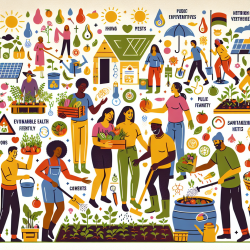Community gardening is more than just a way to grow fresh produce; it's a powerful tool for fostering sustainable lifestyles. The JArDinS quasi-experimental study delves into this intriguing concept, providing valuable insights that can help practitioners enhance their skills and encourage further research.
The JArDinS Study: A Closer Look
Conducted in Montpellier, France, the JArDinS study aimed to assess the impact of community garden participation on sustainable lifestyle adoption among adults. This quasi-experimental study involved 66 new gardeners compared with 66 non-gardeners over a year. The researchers evaluated various lifestyle components, including nutritional quality, physical activity, mental well-being, and environmental awareness.
Key Findings and Implications
- No Significant Impact: Surprisingly, the study found no significant impact of community gardening on fruit and vegetable supply or other lifestyle components such as physical activity and mental well-being. This challenges previous cross-sectional studies that suggested positive health outcomes from gardening.
- Pre-Existing Awareness: Qualitative interviews revealed that many participants already had a strong health and environmental consciousness before joining the garden. This pre-existing awareness might explain the lack of significant changes observed in their lifestyles.
- Barriers to Participation: The study highlighted several barriers to active participation in community gardens, including lack of time, insufficient gardening knowledge, and physical challenges. These obstacles often hindered participants from fully engaging with the garden.
Strategies for Practitioners
The findings from the JArDinS study provide valuable lessons for practitioners looking to leverage community gardening as a tool for promoting sustainable lifestyles:
Overcoming Barriers
- Time Management: Encourage flexible schedules that allow participants to engage with the garden at their convenience. Consider organizing weekend or evening sessions to accommodate different work schedules.
- Gardening Education: Provide workshops and resources to equip gardeners with essential skills and knowledge. This can include beginner courses on planting techniques, pest management, and soil care.
- Physical Accessibility: Design gardens with accessibility in mind. Raised beds and ergonomic tools can make gardening more manageable for individuals with physical limitations.
Enhancing Community Engagement
- Create Social Opportunities: Foster a sense of community by organizing social events and group activities within the garden. This can help build relationships among participants and enhance social cohesion.
- Mediation and Conflict Resolution: Appoint facilitators to mediate conflicts and promote a harmonious environment within the garden. This can prevent interpersonal issues from discouraging participation.
The Path Forward: Encouraging Further Research
The JArDinS study underscores the need for continued research into community gardening's potential benefits. Future studies could explore longer-term impacts, diverse participant demographics, and additional lifestyle components not covered in this study.
To read the original research paper, please follow this link: Improving lifestyles sustainability through community gardening: results and lessons learnt from the JArDinS quasi-experimental study.
The journey towards sustainable living is ongoing, and community gardens hold immense potential as catalysts for positive change. By addressing barriers and fostering inclusive participation, practitioners can unlock the full benefits of these green spaces for healthier communities.










